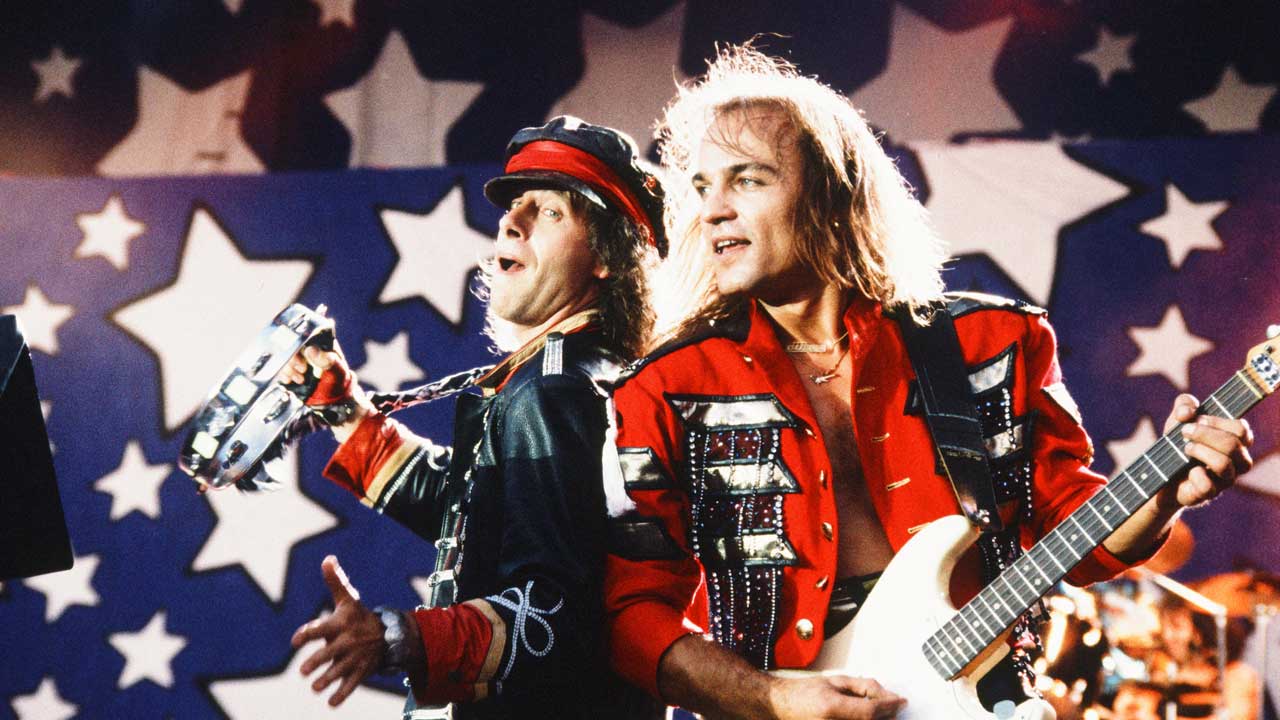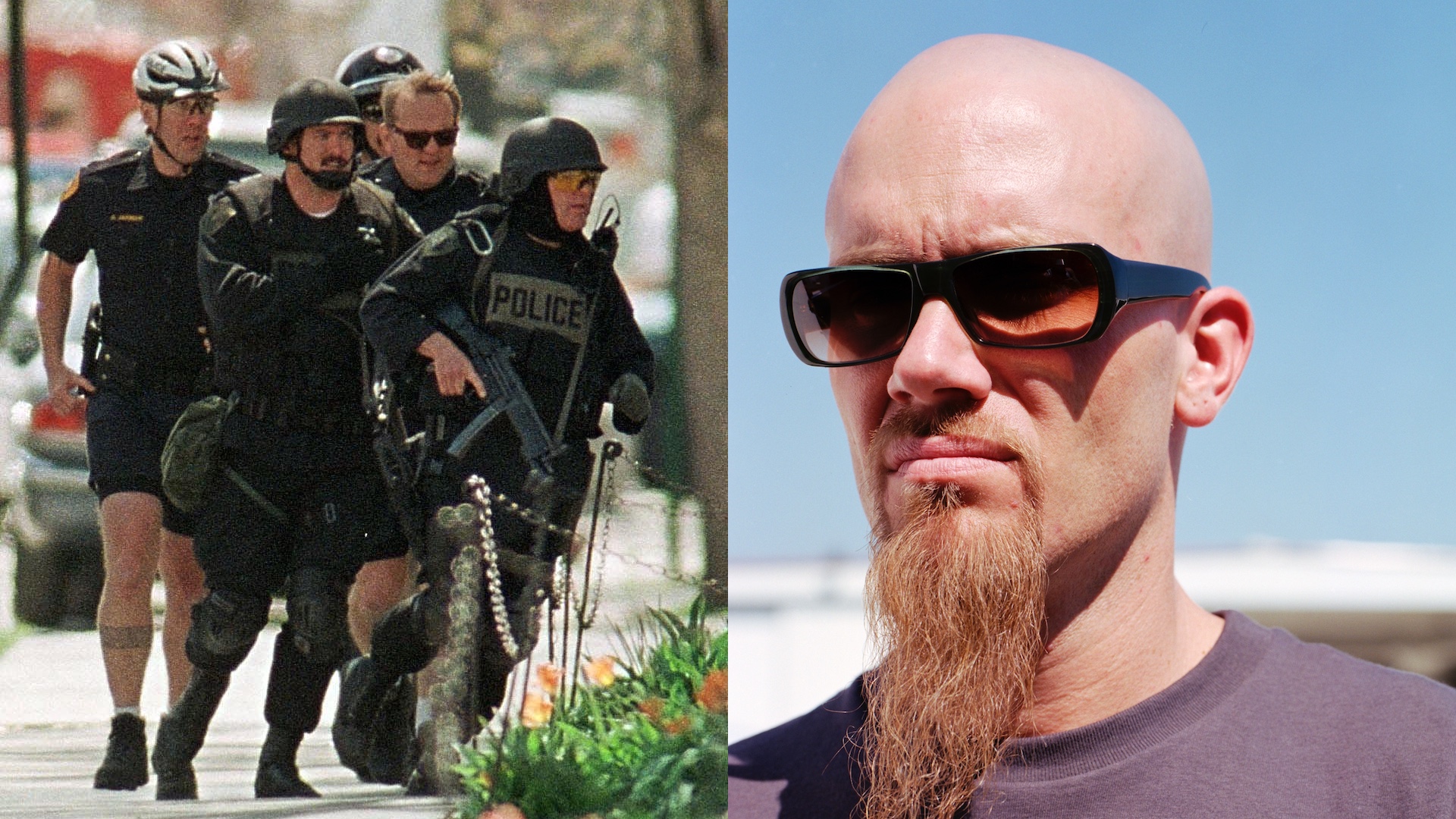Wind Of Change: the story of the most monumental power ballad ever
Inspired by a Moscow festival crowd, the Scorpions' Wind Of Change came to represent the fall of the Berlin Wall, but now its message of reconciliation and hope is now being tested

A man whistles, wistfully.
He whistles again to make it count and brings the melody around again.
His whistling then ascends in register as if he’s turned to you to ask, ‘do you like my whistling?’, while the intensifying tinkle of a fretboard lets you know that he does not whistle alone.
Love it or hate it, you know that you know how it goes.
That’s because in the annals of rock music there’s no song more instantly recognisable or intertwined with one of the most seismic geopolitical shifts of the 20th century – the fall of the Berlin wall – than Scorpions' Wind of Change. Only thing? It was written about something else entirely. Confused? You aren’t alone.
Let’s say this first: Wind Of Change is arguably one of the most monumental and best-recognised power ballads of all time, and it’s also arguably the commercial apex for Scorpions, who by then had already been responsible for more hits than their humble Hanover origins might have suggested back in 1965.
Sure, Blackout was big, but Wind Of Change alone has sold over 14 million copies. If the story of this anthemic juggernaut was just about sales nobody would care, but then this is no mere song.
Sign up below to get the latest from Classic Rock, plus exclusive special offers, direct to your inbox!
At its core it’s a simple tune about a changing world, and it was inspired by what Scorpions bore witness to when they played the Moscow Music Peace Festival in August of 1989 in front of 300,000 fans at Lenin Stadium alongside Ozzy Osbourne, Motley Crue, Cinderella, and Skid Row. Moved by the experience and the fervour of the crowd, Klaus Meine began to write. Not the most confident guitarist, the singer whistled the lead melody instead.
What resulted was a stirring snapshot of a unique moment in time while the world watched and awaited the outcome of Soviet Premier Mikhail Gorbaciev’s doctrine of Glasnost and Perestroika. Nobody knew where it was leading, but after decades of Cold War anxiety it was a time charged with optimism and a mounting belief in new possibilities, and Scorpions had just written a song to match the zeitgeist, only nobody knew it – yet.
And while it’s only possible to speculate on what that Soviet experience meant to the likes of Vince Neil or Sebastian Bach, there’s no question it would have resonated with a West German band who grew up in the shadow of the Iron Curtain within generational memory of the Reich.
It’s perhaps for that reason that an amusing but intriguing take on the song’s origin – 2020’s Wind Of Change podcast, which posits that the CIA had something to do with producing wind Wind Of Change, could possibly be taken with a pinch of salt. Unless…
“It’s because the story is good, the story is great!” says Rudolf Schenker.
“We live in crazy times,” says Klaus. “When I was confronted by this [CIA] theory, I cracked up laughing. You know, it's really crazy. But this podcast became very, very successful around the world between New York City and Sydney, in Australia. And you could hear everybody saying, ‘You’ve got to listen to this podcast’ you know, as crazy as it is, you know?
"Patrick Radden Keefe, a journalist who works for The New Yorker – he came all the way to Germany, just to tell me in the middle of the interview, ‘Klaus, have you heard the story that the CIA wrote Wind Of Change?’ And I was like, ‘What?! Say that again?’ But then I said, if that were true, it only proves the power of music.”
Contributing to this mythos is of course the fact that the Berlin Wall came down a few months after the Moscow Peace Festival in November of 1989, but Wind of Change wasn’t released until a year later as track four on 1990’s Crazy World album. Even then, it was only released as a single in January of 1991 in Europe – the album’s third after Tease Me, Please Me and Send me an Angel.
“It was released much later because as we always said, ‘Hey, we are rock band, you know, first single off the album would be a rocker. Second single would be another rock song, you know?” says Klaus. “And then somebody figured out, ‘okay, maybe Wind Of Change could be a nice single.’ But it was nothing to do with marketing. Back in those days no one said, ‘you know, since the Berlin wall came down, this would be a great song for this moment in time’. Nobody said that.”
It was arguably Wind Of Change’s promo video however which used footage of turmoil, including the fall of the Berlin Wall, which captured imaginations in every time zone and distilled an important feeling. Politically, massive change was underway. Communism was collapsing, and the Soviet Hammer and Sickle would fly above The Kremlin for the last time in December of that same year. Finally, there was a song to match, and it came from a very real place.
“We grew up in the shadow of the Berlin Wall in a way, you know,” says Klaus. The divided country and the Berlin Wall, this was just a fact, it was a reality of our lives being German citizens. In the early days, when we played shows in Berlin, you had to go through the transit autobahn, and the first checkpoint – Helmstedt – is just 100km away from where we grew up. People were getting killed, getting shot when they tried to make it from the East to the West, you know, and, of course, it's a different story from the English perspective, or British perspective, or American perspective.
"This was our reality. And this was after the war, when the country was divided into all these different zones, and when the wall came down, it was such an emotional moment, in European, in world history. You never can write a song for, for a historical event like this, it's impossible. But the reason or the fact that Wind Of Change, for so many people, brings back the memories of this historical moment in time.”
So what does Wind Of Change mean 30 years on? While it’s inseparable from that transformative moment, more recently Klaus Meine told Ukraine’s TCH that the recent invasion by Russia left him with mixed feelings about the song.
“This is not the time to romanticise Russia with lyrics like, ‘Follow the Moskva / Down to Gorky Park’, I wanted to make a statement that we support the Ukraine in this very difficult situation,” he says. “So many years later now, I think the song has lost the meaning of being a peace anthem, being a song of hope. I had to change those lyrics."
"Listen to my heart / It says Ukraine," Klaus sings now. "Waiting For The Wind / To Change."
Scorpions latest album Rock Believer is out now.
Alexander Milas is an erstwhile archaeologist, broadcaster, music journalist and award-winning decade-long ex-editor-in-chief of Metal Hammer magazine. In 2017 he founded Twin V, a creative solutions and production company. In 2019 he launched the World Metal Congress, a celebration of heavy metal’s global impact and an exploration of the issues affecting its community. His other projects include Space Rocks, a festival space exploration in partnership with the European Space Agency and the Heavy Metal Truants, a charity cycle ride which has raised over a million pounds for four children's charities which he co-founded with Iron Maiden manager Rod Smallwood. He is Eddietor of the official Iron Maiden Fan Club, head of the Heavy Metal Cycling Club, and works closely with Earth Percent, a climate action group. He has a cat named Angus.

